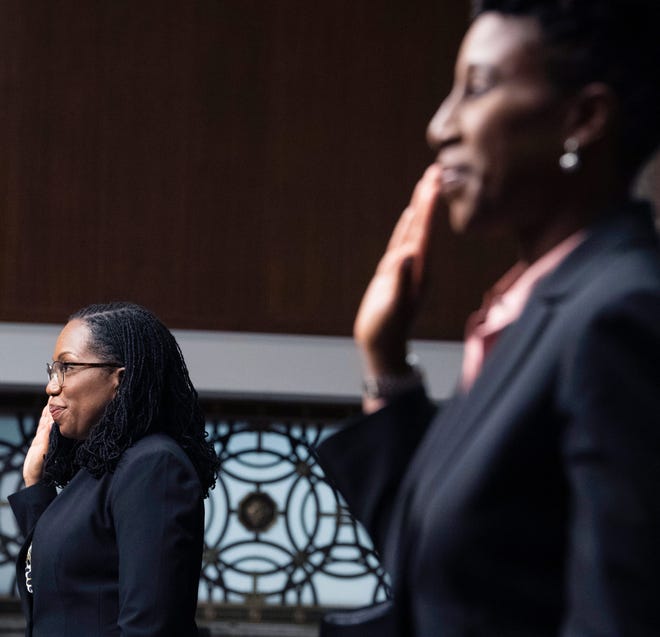
WASHINGTON – President Joe Biden announced a new round of judicial nominations Wednesday that underscored the administration's push to expand diversity on the federal bench as the White House moves rapidly to put its own stamp on the judiciary.
Among the new federal judge candidates Biden will be sending to the Senate for confirmation: The first Native American federal judge in Washington State; the second judge from Puerto Rico to sit on the Boston-based U.S. Court of Appeals for the 1st Circuit and the second Black woman to serve on the New York-based 2nd Circuit.
Biden is steadily filling judicial vacancies after his predecessor, former President Donald Trump, exerted an outsized influence on the judiciary during his four years in office. Trump managed to install more than 220 federal judges but critics note the Republican's nominees were far less diverse than those named by past presidents in either party.
Biden's third wave of judicial nominees includes three candidates for district courts and three for appellate courts, bringing to 20 the total number of judges he has named since taking office January 20. There are currently 81 vacancies in the federal court system.
Jackson:Biden to elevate potential Supreme Court nominee to appeals court
Diversity:Biden aims to put a Black woman on the Supreme Court, underscoring lack of lower court diversity
Among Biden's latest nominees is Gustavo Gelpí, appointed by President George W. Bush to the U.S. District Court in Puerto Rico in 2006. Biden is naming the 55-year-old San Juan native to the Boston-based appeals court, the second appointment of a Puerto Rican to that court in its history. The nomination comes months after the death of Juan Torruella, a groundbreaking judge who in 1984 became the first Puerto Rican named to the court.
Gelpí has served as the Puerto Rico district court's chief judge since 2018.
"Judge Gelpí has led a distinguished legal career, and is widely regarded by several political factions in Puerto Rico as a fair and impartial jurist," said Rep. Nydia Velazquez, D-N.Y., the first Puerto Rican woman elected to the House. When Torruella passed away, she said, "we lost a giant of the legal system," adding that she hopes Gelpí "continues his legacy as he makes history in his own right."
Biden will also nominate Lauren King, a Seattle attorney, for the U.S. District Court for the Western District of Washington. If confirmed, King, a citizen of the Muscogee Nation, would be the third active Native American federal judge and the first in Washington.

Working with the Republican Senate majority at the time, Trump had a significant influence on federal courts, including with three appointments to the Supreme Court: Associate Justices Neil Gorsuch, Brett Kavanaughand Amy Coney Barrett. That gave conservatives on the high court an ostensible 6-3 edge for the first time in decades.
Barrett:Amy Coney Barrett steers the Supreme Court to the right, but not to Trump
But Trump's appointments were more likely than past presidents to be white. About 16% of Trump's judicial nominees were Black, Hispanic, Asian or otherwise not white, according to the Pew Research Center. That compares with 18% for President George W. Bush and 36% for President Barack Obama. As a candidate, Biden vowed to change course by appointing federal judges "who look like America."
Biden, who for years was the top Democrat on the Senate Judiciary Committee, also promised to name a Black woman to the Supreme Court for the first time in U.S. history, should he get a chance. That promise partly served to highlight a lack of African American women appellate judges, the usual stepping-stone to the Supreme Court.
Four Black women serve as appeals judges out of more than 170 judgeships, according to the Federal Judicial Center, the research arm of the court system.
In his first round of judicial appointments, Biden named U.S. District Judge Ketanji Brown Jackson to the U.S. Court of Appeals for the D.C. Circuit in March. Jackson, who has met little resistance from Republicans or centrist Democrats in the Senate, is also considered a top candidate for the Supreme Court if an opening occurs under Biden.

White House officials have stressed the administration is pushing to grow diversity on the federal bench not only in terms of race but also professional experience. Some advocacy groups say the federal courts are stacked with former corporate lawyers and that public defenders and other legal backgrounds are underrepresented.
Two of Biden's latest appointments include candidates with deep experience as public defenders. Eunice Lee, who Biden will nominate to the New York-based appeals court, is an assistant federal defender with the Federal Defenders of New York. Veronica Rossman, named to the Denver-based U.S. Court of Appeals for the 10th Circuit, is senior counsel to the Office of the Federal Public Defender for Colorado and Wyoming.
"Most of our nominees are coming from the public sector, or from the defense bar, or other non traditional backgrounds for federal judges," White House Chief of Staff Ron Klain told the Georgetown Institute of Politics and Public Service earlier this year. "We're really focused on trying to fill those courts with qualified people and bring more balance to those courts."
Other nominees announced Wednesday include:
► Angel Kelley, to be nominated to the U.S. District Court for the District of Massachusetts, has served as a state judge in Massachusetts since 2009. Kelley, who was previously an assistant U.S. attorney, would be the second African American woman judge and the second Asian American judge to serve on that federal court.
► Karen Williams, to be nominated to the U.S. District Court for the District of New Jersey, has served as a magistrate judge since 2009. Williams, who is also a law professor at Rowan University, would be the first African American district court judge to sit in the New Jersey district court's Camden courthouse.
Source link








